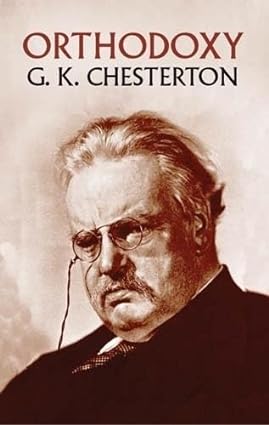We will finish up, G.K. Chesterton’s Orthodoxy this Tuesday with a discussion of Chapter 9, “Adventure and the Adventurer.” One of Chesterton’s recurring examples of the truth of Christianity is the “objective occurrence of the supernatural.” Beginning with his discussion of wonderment in the “Ethics of Elfland” through last week’s discussion on the “Romance of Orthodoxy,” Chesterton rebels against the doctrine of the rationalist-materialist that miracles do not happen, and therefore, God too is bound by the laws of nature. You do not have to agree with Mr. Chesterton concerning the occurrence of miracles as a necessary part of faith, but that is his argument. It is easy to accept the miracles described in the New Testament, such as the restoration of sight to Bartimaeus through the use of dirt and spittle (Mark 10:46-52) or the calming of the storm in the Sea of Galilee (Mark 4:35-41) or the healing of the hemorrhagic woman through her simply touching Jesus’ garments (Mark 5:25-34). However, when the same type of miracles are found elsewhere, we (meaning me) often become the incredulous rationalists derided by Chesterton.
In 731, the Venerable Bede wrote his great work, The Ecclesiastical History of the English People, in which Bede recounts the history of the Anglican Church from its founding by Augustine (not the author of the Confessions, but another one) as the first Archbishop of Canterbury in 597 through the date of its writing. Throughout this work, Bede relates various miracle that were performed by God through various saints and relics. I have attached a few of his narratives for your review. The first selection recounts the healing properties of the very dirt where the most Christian king Oswald of Northumbria was slain. Bk.III, ch.9. The second selection tells of the calming of a storm in the North Sea by applying holy oil blessed for that purpose by Bishop Aidan of Lindisfarne to the waves. Bk.III, ch.15. The final except relates how a relic of St. Cuthbert (his hair) healed a diseased eye, as testified to by the very man whose eye was healed. Bk.IV, ch.32. Please read these narratives and think about if 1) Chesterton would accept the possibility that these miracles might be true, and 2) whether you accept the possibility that these miracles might be true. As to 2, if a) you do not accept the possibility of the truth of these miracles, does that show a lack of faith in God’s sovereignty or b) if you do accept the possibility that these miracles may have occurred (including to the horse), then what of magic places, holy oil and relics?
Dinner is at 6. The menu is tomato-basil soup with club sandwiches. Hope to see you here. And if you haven’t read Chesterton nor the excepts from Bede, please come anyway.

